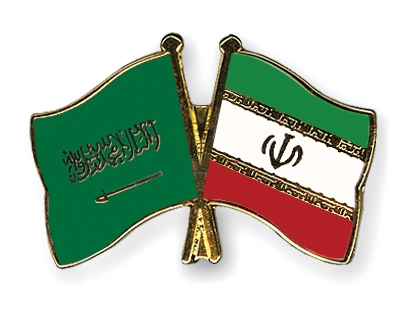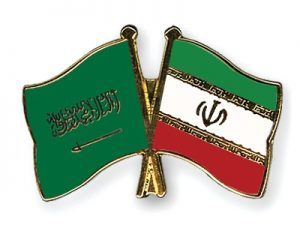
Rouhani, Saudi Arabia and the promise to improve relations with regional neighbours
Improving Iran’s bilateral relations with the Persian Gulf states, especially Saudi Arabia, was one of Hassan Rouhani’s campaign promises during the 2013 elections. Since taking office, Rouhani has found numerous occasions to emphasize this matter and has made it a priority in his foreign policy agenda.
During the past three decades, Iran has had complicated relations with the Persian Gulf states. “Iran’s relations with the Arab monarchies of the Persian Gulf can be described as ambivalent and fraught with rivalries” Reza Akhlaghi, who manages Foreign Policy Concepts tells Rouhani Meter. “The fraught nature of this relationship is crystallized in the Gulf Cooperation Council (GCC)’s discorded policies toward the Islamic Republic and Iran’s increasingly assertive foreign policy.”
Meanwhile, relations with Saudi Arabia, one of Iran’s significant rivals in the region, have always been rigid and volatile. However, with Saudi’s new head of state King Salman, and since the election of Rouhani, both states adopted a moderate tone with many experts believing that relations between the two countries were finally about to take a positive turn.
What follows is an assessment on Rouhani’s performance towards establishing good relations with the Persian Gulf states and more specifically, with Saudi Arabia. The report also analyses the regional crisis in the Middle East, and the escalation of tension between Tehran and Riyadh to further track Rouhani’s actions in fulfilling his campaign promise.
Rouhani’s promise to improve relations with neighboring countries
During his first press conference after becoming president in 2013, Hassan Rouhani said his priority in foreign policy is to have friendly relations with neighbouring countries. He stressed that Iran is determined to establish close diplomatic relations with its neighbours. Regarding Iran’s relations with Saudi Arabia, Rouhani said there are grounds to expand on economic and political ties with the Saudis.
Moreover, president Rouhani pointed out his involvement in the security agreement between Iran and Saudi Arabia signed in 1999, and that his administration is determined to revitalize the agreement and to pursue a moderate policy towards Saudi and other neighbouring countries.
Rouhani’s administration took a few steps that displayed a moderate foreign policy toward Saudi Arabia including congratulatory notes by Rouhani, his vice president and foreign minister Zarif to the Saudi King on the occasion of Saudi’s national day. Rouhani also accepted a personal invitation from the King for a Hajj pilgrimage. However, Iran’s foreign ministry later claimed that the president would not be traveling to Mecca despite accepting the invitation. Deputy to foreign minister Zarif said that “the existing positive atmosphere encourages both parties to have meetings and consultation when the time is right.”
Iran and Saudi Arabia, a new chapter in their relations
In September 2014, Saudi and Iranian foreign ministers met in New York. After negotiations with his Saudi counter part, foreign minister Zarif described his meeting as a new chapter in relations between the two nations: one that would benefit international peace and security and the interests of Muslims around the world. Mr. Al-Faisal, Saudi’s foreign minister also said Iran and Saudi Arabia are two influential countries in the region and that their cooperation has an undeniable impact on regional and global peace and security.
However, over a year later and this new chapter is far from beginning. In fact, tensions between the two countries have reached the highest level through both countries’ roles in Yemen, Syria and Iraq.
Disputes between the two countries rose when Iran-backed Houthis began fighting against the Saudi-backed government in Yemen. Eventually, the tension reached its peak when a tragic accident in the Mena Desert killed 1400 Hajj pilgrimages, including 465 Iranians.
It is reported that a few days after the accident in the Mena Desert, foreign minister Zarif’s request to meet with his new Saudi counterpart, Adel al-Jubeir was rejected in New York. Iran’s government spokesperson criticized this move, in what he called the Saudis’ “hostility towards Iran.”
Following such developments, president Rouhani used his speech at the UN General Assembly in New York as an opportunity to publicly condemn Saudi’s management regarding the Mena incident. He said the high fatality rate was a result of the Saudi government’s “incompetence and mismanagement.” Rouhani’s criticism during a significant time such as the UNGA was a profound indication of deep strains between the two countries.
Following Rouhani’s speech, other government officials in Iran, including the Supreme Leader, military commanders and judicial authorities sharply condemned the Saudis regarding their mismanagement of the Mena accident. Response from the Saudi government took a threatening tone and Rouhani immediately warned of more ‘robust’ action against any further developments.
Failure to repair relations
Despite pressure from other government bodies, the Iran’s president has significant power over foreign relations. For example, former president Khatami had a significant role in the improvement of relations with Saudi Arabia during his presidency.
However, the Supreme Leader plays a decisive role in determining diplomatic relations with countries that are hostile towards Iran, including the United States and Saudi Arabia. Nonetheless, in the past two years efforts for constructive engagement with global powers, including the nuclear issue, have proceeded largely according to Rouhani’s government.
Prior to the Mena incident, Iranian government officials showed a willingness to restore relations with Saudi Arabia. Many observers believed that the reason behind Iran’s friendly tone towards the Kingdom was to avoid any obstacles in reaching a nuclear deal. They argue that since the beginning of the nuclear negotiations, the moderates had full control over Iran’s foreign affairs and have avoided any tension with the Saudis. Some even speculate that if Iran had used the same tone as it is using today, Saudi Arabia would have done what was possible to terminate the nuclear talks.
During the nuclear negotiations with P5+1, Zarif made a strategic trip to Qatar and Iraq where he received significant attention from western media. Lebanon’s Al-Safir paper wrote a promising piece on Iran’s meeting with Kuwaiti officials and their discussion on fighting against terrorism and resolving regional disputes. The piece also stated that Iran was ready to have more open relations with its neighbouring countries.
In other developments, security forces in Bahrain announced that they discovered a large bomb-making warehouse near the capital and identified affiliates with Iran’s Revolutionary Guards. Shortly after, Bahrain gave Iran’s ambassador 72 hours to leave the country. Iran then denounced Bahrain’s Ambassador to Tehran. The recent escalation of tension between the two countries marks the lowest level of diplomatic relations seen in both countries’ contemporary history.
Shortly after the disaster in the Mena Desert, Rouhani stressed the importance of maintaining economic relations with neighbouring countries. During a press conference, Rouhani said he hopes neighbouring countries would join in to cooperate in order to maintain peace and security in the region.
Meanwhile, foreign minister Zarif told Kuwait’s Al-Rai newspaper that if Iran has been able to reach an agreement with the West, it can certainly do so with Saudi Arabia as well. However, he criticised Riyadh’s position on the nuclear deal and commented that it was in line with Israel.
It is still not certain where the relationship between the two rivals is headed. Reza Akhlaghi of Foreign Policy Concepts believes “Iran’s relations with the GCC will not see any major changes as long as the fate of the Assad regime remains in limbo and a new political order,irrespective of its nature,is not emerged in Syria.”
However, diplomatic relations between the two countries are ultimately dependent on the decisions of Iran’s Supreme Leader and the Saudi king. In recent years, tensions between the two countries resemble their relations in the 80s where there was a complete void of diplomatic relations.
As far as Rouhani’s campaign promise goes, it seems that efforts to improve relations with Saudi Arabia and other Gulf states have been unsuccessful and so far, Rouhani has been unable to fulfil his campaign promise in this area.

